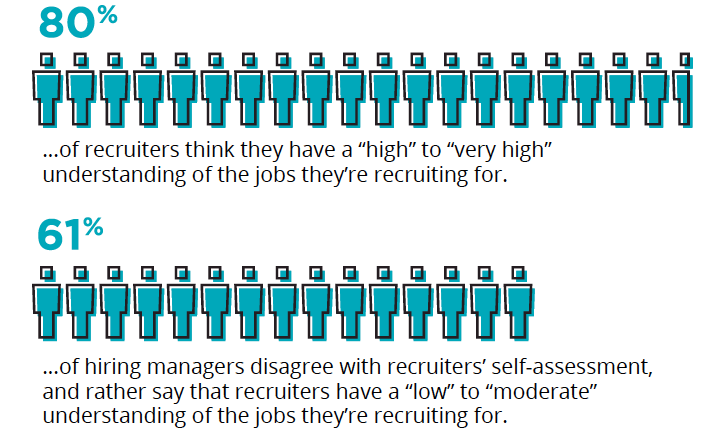Recruiters and hiring managers have the same goal – to get the perfect candidate into a vacant role – but more often than not, they’re not on the same page.
In fact, according to the iCIMS Hire Expectations Institute, which surveyed 375 hiring managers and 600 recruiters, 80 percent of recruiters think they have a “high” to “very high” understanding of the jobs for which they recruit, but 61 percent of hiring managers say that recruiters have a “low” to “moderate” understanding of the jobs they’re recruiting for.

So what can recruiters do to better collaborate with hiring managers and eliminate the gap between their own perception and their colleagues’ reality?
Interview the hiring manager before interviewing candidates
According to Co-founder and Chief Strategy Officer of GreenJobInterview Greg Rokos, the best way for a recruiter to start the hiring process is by interviewing the hiring manager. Don’t just ask for a job description; ask questions and make the process a collaborative effort.
“What happens too often is that hiring managers don’t take enough ownership of their own recruitment and put it squarely on the recruiter,” Rokos said. “It is easy to sit back and make negative comments about the candidates you are presented with, but often hiring managers aren’t spending enough time with the recruiter to help them understand the nuances of the role.”
When Rokos, a 25-year veteran of the recruiting industry, is presented with filling a challenging role, he often arranges a video call with the hiring manager to do a deep dive into the nitty gritty of the role. Having a conversation and batting around ideas with the hiring manager often helps unearth needed skills or necessary traits that will ultimately create a better job description.
Utilize prescreening tools to pare down your applicant pool
Prescreening of candidates should be about more than recruiters merely verifying that an applicant has relevant experience. Other tools, such as online questionnaires and skills tests, can easily help eliminate unqualified candidates early in the process, saving hiring managers precious time during the face-to-face interview phase.
Eric Calderaro, a seasoned hiring manager involved in filling open security positions at Hotel Nikko San Francisco, provides another example of how a thorough prescreening could save a hiring manager time and a company money. In his field and many others, like finance and IT, a criminal background check is required for all hires. He wishes that that this prescreening step could be performed earlier in the process so that candidates whose backgrounds don’t pass muster can be immediately eliminated.
“If we bring a candidate in for a face-to-face interview it means we are serious about them,” he said. “If background checks could be done earlier, I would know that there won’t be any surprises.”
Delve more deeply into a candidate’s work history
With people changing jobs more frequently than ever – according to a Gallup poll, 60% of millennials are open to a new job opportunity at any given time – the reason a candidate has separated from a past employer is important.
While jumping from job to job isn’t in itself a red flag, Calderaro said, the reason an applicant is no longer with a past employer potentially could be. He believes it would be beneficial for recruiters to delve deeper into the reasons behind a candidate’s job changes, and then clearly communicate those reasons to a hiring manager. Doing so, he said, would allow him to focus his interview questions to address any potential red flags, such as involuntary terminations or long lapses in employment, and check for inconsistencies in a candidate’s responses.
Develop credibility and rapport with candidates
It’s just as important to understand what the candidate wants out of a new position as it is for recruiters to understand what a hiring manager needs, Rokos stressed. This, he said, is one easy way to decipher if a candidate should be presented to a hiring manager.
“If you can establish credibility and rapport with a candidate, they are more likely to open up to you and tell you what really drives them,” Rokos said. “Anyone can look at a resume but I want to know what makes them tick. What’s motivating this job search? The real human motivators are what a recruiter really needs to figure out.”
Rokos establishes rapport and credibility with candidates by asking questions and listening. “You really have to have empathy and care about people and be excited about your candidates’ goals to do this job well,” he said. “If you don’t have that caring and empathy, you probably shouldn’t be in this business.”
Continue the discussion after the hire is made
With job hopping so prevalent, your new hire most likely won’t be in his or her position forever. Rokos believes it’s beneficial for hiring managers and recruiters to chat again six months and 18 months after a hire has been made to determine how successful the candidate has been in the role.
This isn’t a performance review, rather an assessment of how close the recruiter and the hiring manager came to finding the perfect candidate and what other qualities they might look for next time they fill the same role. How is the new hire melding with the team? How is he or she responding to the management style?
If a recruiter can have that level of understanding it makes all the difference because then down the road they can focus on these key but subtle points about the role that might not have been obvious the first time around.
 MightyRecruiter
MightyRecruiter




Leave a Reply